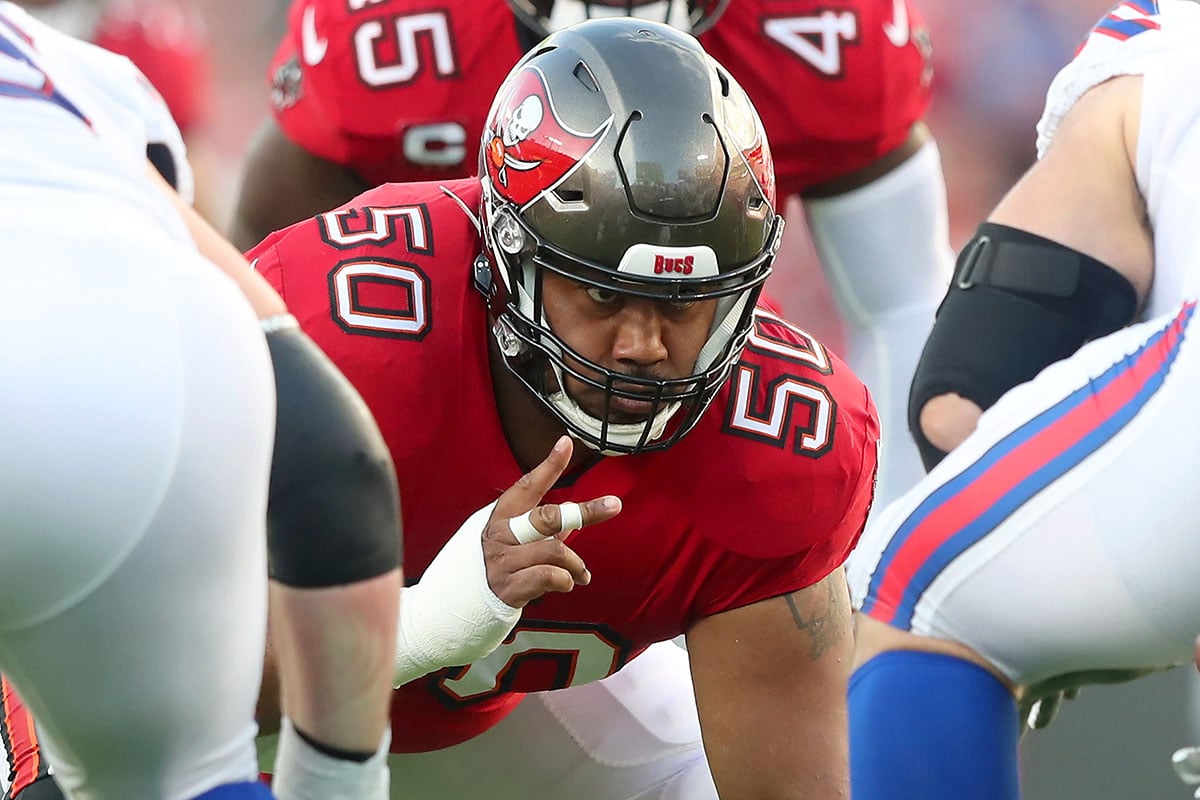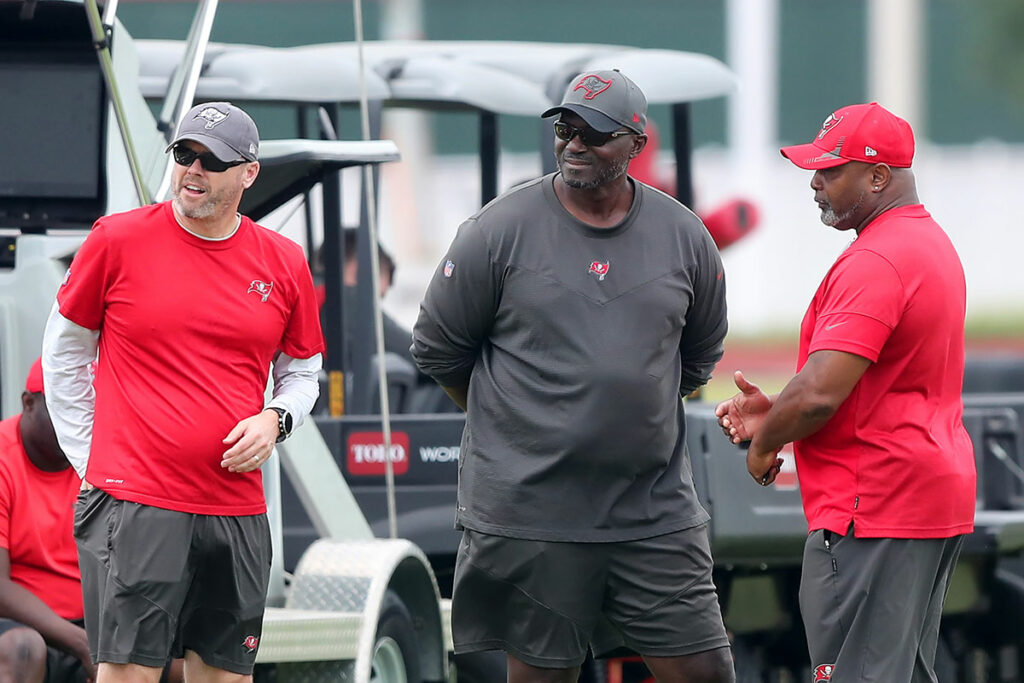Bucs head coach Todd Bowles has a simple principle that he bases his defense on. This principle can be summed up in three words: “Stop the run.”
You see it in the way the team makes personnel decisions. Consider Vita Vea, Keanu Neal, Lavonte David, Devin White, Shaq Barrett and Rakeem Nunez-Roches. All of these players are known for their abilities to help shut down opposing offenses in the run game.
And while the team’s run defense has traditionally been elite in Bowles’ tenure, it certainly took a step back in 2021. The team’s overall rushing yards against ranking was a still a very impressive No. 3. However, that was more a reflection of opponents choosing not to run the ball against Tampa Bay, rather than a relative lack of success when actually running.
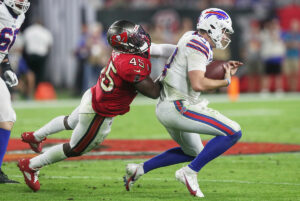
Bucs ILB Devin White – Photo by: Cliff Welch/PR
Of the 10 best teams against the run in 2021 in terms of yards allowed, the Bucs ranked dead last in yards per carry allowed at 4.29. That is backed up by Tampa Bay’s No. 11 ranking in PFF’s run-defense ratings from last year.
Looking over the Bucs’ 2022 schedule, the run defense is set to be tested more than ever. Between Baltimore, New Orleans, San Francisco, Arizona and Cleveland, Tampa Bay is set to face teams that finished in the Top 10 in rushing last year in more than one-third of their games. If you add in Pittsburgh and Atlanta, who have moved on from future Hall of Fame quarterbacks and look poised to emphasize the run game more, it’s possible Tampa Bay could play up to nine of its games against run-first teams.
Last Year
Last year was a similar story, with the Bucs matching up against Top 10 rushing units six times. How did the team fare in those matchups?
Dallas
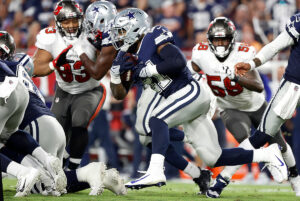
Cowboys RB Ezekiel Elliott – Photo by: USA Today
Week 1 saw the Bucs face off against the Cowboys. Dallas, as many teams did in 2020, decided not to test the Bucs’ run defense all that much. They managed to run the ball just 14 times for a mere 52 yards. Dak Prescott dropped back to pass 63 times in the season opener. The 3.7 yards per carry average was lacking, and Tampa Bay’s 69.6 PFF grade was a solid-if-unspectacular mark. The Bucs eventually won the game 31-29 in a passing shootout.
@ New England
In Week 4 against New England, the Bucs were able to get the Patriots to abandon the run completely. The Patriots only rushed the ball EIGHT times all game. Those runs netted them NEGATIVE one yard. That earned the Bucs a season-high 87.3 run defense grade from Pro Football Focus. This helped Tampa Bay win 19-17.
@ Philadelphia
The tests continued two weeks later against the Philadelphia Eagles in Week 6. Over the course of that game, the Bucs limited the Eagles to only 19 rushing attempts. This represented a 41% reduction from Philadelphia’s season average of 32.35. Now, the Eagles were able to generate some success on these carries, as they created 100 yards of offense and a healthy 5.3 yards per carry. Tampa Bay’s PFF grade in run defense also reflected this, standing at just 54.2. Despite the struggles defending the run, the Bucs still won 28-22.
@ Indianapolis
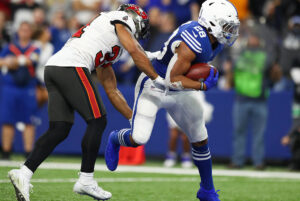
Bucs FS Antoine Winfield, Jr. and Colts RB Jonathan Taylor – Photo by: USA Today
In Week 12, the Bucs traveled to Indianapolis to face Jonathan Taylor and the Colts. Taylor was just starting to enter the MVP discussion and represented the most talented running back Tampa Bay would face all season. The Colts’ final rushing marks belie the true story, as Colts head coach Frank Reich would later discuss following the game. Officially, Indianapolis had 20 carries for a very efficient 107 yards. However, as Reich would explain, the team called many more run plays through RPOs and quarterback Carson Wentz ended up passing in many of those situations. The Bucs had trouble handling Taylor in the second half when he did get the ball in his hands, and their PFF grade showed that with a dismal 51.8 score. Tampa Bay did get the victory, winning 38-31.
Buffalo
This game will mostly be remembered for the Breshad Perriman overtime catch and run for the win. But looking beyond that exciting play, we see the Bucs had some real issues with the Bills’ running attack. Buffalo was able to rip off 173 yards on just 19 carries. Whether you look at the 9.1 yards per carry average or the equally abysmal 46.2 run-defense PFF grade, it was bad. Josh Allen led the way with 12 carries for 109 yards in a quarterback option masterclass, while Devin Singletary contributed 52 yards on just four carries. Despite these struggles, the Bucs were able to hold on for the aforementioned overtime win, 33-27.
Philadelphia (Playoffs)
Once the regular season concluded, Tampa Bay’s run defense was put to the test once more in a rematch against the Eagles. In the original matchup, Philadelphia was limited in opportunities but exploited Tampa Bay in efficiency. This time, the Eagles decided to commit to running the ball to the tune of 31 carries. Those carries created just 106 yards of offense. The overall 3.4 yards per carry was disappointing for the visitors. Now, this is a game where the PFF grade and the traditional stats diverge. Tampa Bay’s grade was one of its worst of the season (36.7) despite limiting the Eagles to minimal yardage.
This year, the schedule favors the Bucs to a certain degree defensively, at least when looking at philosophy. The defense feels it is at its best when it is effectively shutting down a team that is committed to the run. In practice, that has been a mixed bag. With several run-first teams looming in 2022, Bowles and his defense have an opportunity to re-establish that “stop the run” mentality.
Josh Queipo joined the Pewter Report team in 2022, specializing in salary cap analysis and film study. In addition to his official role with the website and podcast, he has an unofficial role as the Pewter Report team’s beaming light of positivity and jokes. A staunch proponent of the forward pass, he is a father to two amazing children and loves sushi, brisket, steak and bacon, though the order changes depending on the day. He graduated from the University of South Florida in 2008 with a degree in finance.

